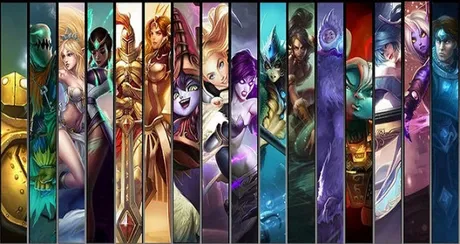
Everyone wants to carry
We all want to play the hero.
We are the main character of this story.
We want the glory and the respect and the spoils of war.
We want to dominate others within the competition and rise to the top.
This is a common theme that extends deep within the cultural zeitgeist.
Nobody wants to be the sidekick; the Robin to Batman.
Too many chiefs not enough indians.
Unfortunately the real world has other plans. Some dedicate their entire lives to playing a sport that they'll only good enough to warm the bench. Everyone seems to think it's glamourous to play games for money but the hard truth is that type of work is the most difficult and stressful type of job there is. The entertainment business is not a forgiving one. Competition is fierce, and job security is typically non-existent. One false move and poof you're gone.
A little backstory.
It's been many years since I played the most toxic video game of all time. It's called League of Legends and last I checked it is the most fetid cesspool of poor sportsmanship in the galaxy. If you're looking for examples of how not to act, look no further than the bronze league heroes of LoL. Honestly they should do professional psychological experiments on these degenerates. There must be a wealth of untapped insight to be divined from such a place.
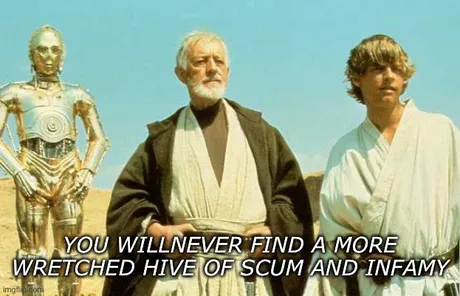
The Meta
Back in the good ol days of this game it used to be called DOTA and it was extremely casual. It was a custom map on Warcraft 3 that became more popular than Warcraft 3 itself, which was quite impressive. In fact that custom map created by random plebs kickstarted the entire MOBA genre of gaming. Eventually the creators started their own company called Riot and created LoL, and some others forked off and created DOTA 2, which many people tell me is better than LoL but I wouldn't know I've never played it.
In any case back when the game was casual there was no meta; it was just a complete free-for-all of everyone running around doing whatever they wanted. There were a lot of problems with that: the main one being that if one person ragequit the game they ruined it for everyone else. After a while the best teams realized there was an ideal way of running the map, which goes as follows:
- Tank Top
- AP Mid
- ADC/Support Bottom
- Jungle
In these types of games there is only so much gold and XP to go round to make your character more powerful. That gold/XP is mainly derived by slaying brainless NPCs. There are 3 automated lanes that spawn NPCs on timed intervals and travel down the lanes blindly attacking anything they come across (which is usually just the other side's NPCs).
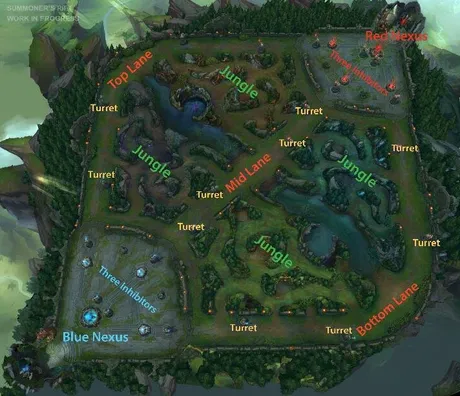
There are also NPCs scattered between the 3 lanes called the jungle that can be killed solo if you're strong enough and have nothing else to do. Used to be the Jungle class didn't even exist because tanking all that damage solo and keeping up with everyone else was quite difficult at level 1. Also because the other team didn't have a jungle that meant that it would often be 2v1 in the top lane and would be very hard for that one guy on your team to stay alive and farm gold. However eventually people realized the Jungle was super powerful and could just pop out of nowhere and gank anyone that was out of position or otherwise overextended. Unfortunately this is all a very long-winded explanation for the point I'm trying to get at.
ADC
Used to be that you'd just pick the character you wanted to play; your favorite one. This was expected. Now doing something like that is considered trolling. You don't pick certain characters (like ADC) and then demand going top lane like players would back in the day. The Attack Damage Carry is normally an avatar with a gun/bow that does long-ranged physical damage. They are typically weaker in the early game and stupidly strong in the late game so they go bottom with a support to protect them in the early game.
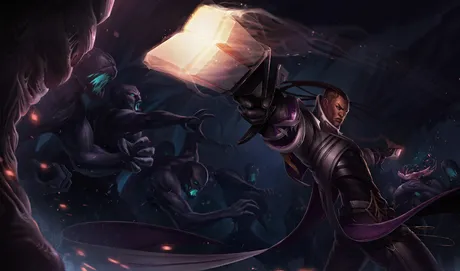
So where am I going with this?
Well, I always liked the idea of going ADC. They are glass cannons. They hit hard but also die quite fast. Play the game well: get ahead of everyone else and just snowball the entire game for a victory. Such an outcome is a satisfying experience. Get 10 kills and 0 deaths and it's game over. Claw your way out of "elo hell".
Elo Hell
There is a fascinating ultra-toxic and wholly counterproductive psychological fallacy within the low-ranks of this genre dubbed "elo hell". The elo rating system originates from chess and is a somewhat complicated way to rank players based on performance within a zero-sum win-lose type game. It's been adapted to serve pretty much every competitive video game as well. The premise of the system is quite simple: win games and your rank goes up; lose games and it goes down. Most of the complexity of this system stems from the fact that differences in rank directly affect how many points you'll get or lose on a given outcome. Beating weaker opponents might only give 7 points but losing to them might cost you 13 (and vice versa).
Elo Hell Myth
The premise of elo hell is that everyone thinks they deserve to be a higher rank than they are but they keep losing because the matchmaking system constant pairs them with inferior teammates. When the player wins it was "deserved" and "entitled" but when the player loses it's always someone else's fault. This toxic and delusional mindset goes all the way up the ladder but is much more common at the bottom of the food-chain.
It's also a mindset I've stumbled across many times during my years as a professional poker player. When somebody gets lucky they attribute it to skill but when they get unlucky it's because the world is tilted against them. The human brain clearly has a hard time with rectifying random events with its own ego. By extension, surely this must happen when it comes to cryptocurrency as well, but the veil of crypto is thick because it isn't a measurable zero-sum game like poker or e-sports (contrary to what most people say about the markets). Actually just kidding we've all seen the memes.
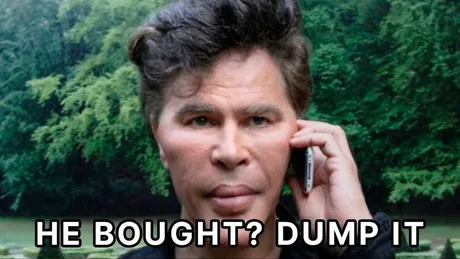
When I buy crypto it always dumps but when I sell it always pumps.
The delusions of persecution and grandeur extend across all games of chance. We see patterns where there are none.
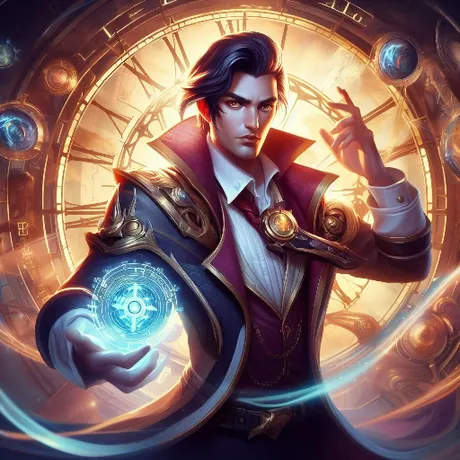
The biggest problem is time and the law of averages.
Assuming the player in question does actually deserve to rank up... how long is that actually going to take? The average LoL game takes something like 40 minutes from start to finish (including matchmaking a load times). If this player is winning 55% of their games because they're better than the average and have a 5% edge... well then after 100 games they're going to have 45 losses and 55 wins. That's only +10 wins in the grand scheme of things, and it took 4000 minutes (67 hours) to get there. It will take hundreds of hours of play before said player is at the correct rank and winning 50/50. Yikes. That's quite the time commitment... and then the season might end and you lose your rank. Not cool, game!
Nobody wants to support!
Getting back to the actual topic I wanted to discuss, it used to be a huge problem forcing someone on the team to play the support role. Nobody wants to play support because the support's job is just to help other players on the team (literally taking one for the team). They don't typically do enough damage to get a kill, they have to rely on their team to carry them, and they are always poor because they don't farm. It's not a glamourous or exciting position in the slightest. In combination with the concept of elo-hell nobody wants to rely on their "bad teammates" to carry them.
This problem led to all kinds of toxicity such as people being forced into the support role intentionally ruining the game or just leaving during the matchmaking process. There were times when you'd have to do matchmaking like five times in a row because someone didn't get what they wanted and just ragequit (making the average game time even longer than 40 min). This was insanely annoying but they eventually came up with a good fix with proper incentives that allowed players to choose their role in advance.
Those who were willing to play support had zero wait times because there was a shortage of that role. Those who were not willing to play support might wait 5-10 minutes just to enter matchmaking and character selection. This solution pretty much worked out for all parties concerned because it got more people to play support; there was now a reward for doing so, while those who REALLY didn't want to play certain roles were able to opt out of those positions at the cost of a longer wait. Everyone gets what they want.
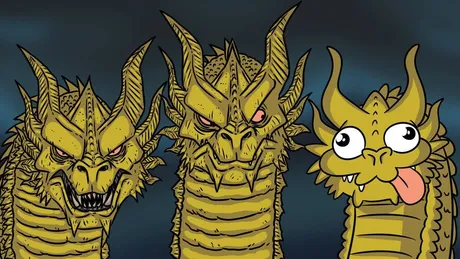
Chasing the dragon
I've learned something about myself recently which is the source of this entire long-winded introduction. I don't play these games to win. I play them to chase that feeling of domination: getting those clean-sweep victories in which I'm the only reason why our team won the match. I don't want to win by a little bit; I want to win by a landslide.
This attitude actually costs me a lot of wins and stunts my ability to improve. Rather than play a balanced game and increase my chances of success incrementally I find myself instead always in an overextended and aggressive position that can easily be punished by better players who know what they are doing.
More specifically I've caught myself doing this recently in both Chess and Go. I'm always trying to make some crazy move that ends up with me getting counterattacked and failing given the slightest misstep. Luckily I tend to do exactly the opposite when money is on the line like poker or crypto. I'm much more conservative in my strategy when more than my rank is at stake, and yet still I realize that the implications here are not that I play better when the stakes are higher, but rather more scared and timid. The tilt just materializes in a different way.
In fact I've known this about myself for a long time and this just happens to be a stark reminder. I remember looking at my LoL statistics years ago and realizing that my winrate on the ADC position was like 46% while my winrate on support was my highest out of everything at like 60%. So even though I didn't like playing support and felt like it was a bad idea to rely on my teammates... being forced into that non-aggressive position was my greatest source of success. I must admit it is a bit of a mindfuck to realize that playing the game the way I want to play it is the ultimate source of failure. Whoops.
In fact the entire economy is basically just a support system for the rest of the economy. Look at Jeff Bezos and Amazon. How did he make his billions? Dude legit just delivers product that other people created from one place to another. Logistics. Nothing could be more support than that. And yet the value of a supporting role is quite high even if it isn't a glamourous one.
Conclusion
Are you trapped in elo hell? Is the world conspiring against you? Do you have the worst luck? Does number always go down when you buy? Well have I got a hard-to-swallow pill for you! None of that is true and you're not the victim. Get good, kid. You mad, bro?

Return from Relegated to a Support Role to edicted's Web3 Blog
